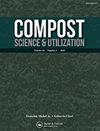生物固体堆肥设施的卫生保证:评估温度-接触时间标准的效率
IF 0.9
4区 农林科学
Q3 ECOLOGY
引用次数: 0
摘要
摘要在处理城市生物固体的全尺寸充气静压桩(CASP)中,研究了温度暴露对病原体的灭活作用。该研究的目的是评估温度接触时间对病原体灭活的影响,并分析堆肥堆中温度的逐渐升高是否会引发一种可存活但不可培养的(VBNC)状态。将22个模拟随机颗粒行为的温度探针与大肠杆菌和沙门氏菌接种,并引入CASP中。研究发现,92%的堆肥堆温度≥55 在堆肥的第一阶段(36天),温度至少连续三天。在翻堆并堆肥20天后,这一数字上升到93%。在活性堆肥结束时,通过培养方法测定的堆肥基质中的粪大肠菌群水平为<103 MPN·g−1总固体,而沙门氏菌低于其<3 MPN·4的检测限 g−1总固体。分子方法表明,存在明显进入VBNC状态的活细胞。尽管如此,结论是需要进一步的研究来评估总体风险,因为其他因素,如pH、有毒化合物以及微生物竞争和拮抗作用,都被排除在这项特定的研究之外。未来,随着本文提出的技术的改进,它们可能有助于验证不同类型的堆肥技术的卫生效果。本文章由计算机程序翻译,如有差异,请以英文原文为准。
Sanitary Assurance at Biosolids Composting Facilities: Assessing the Efficiency of Temperature-Contact Time Criterion
Abstract Pathogen inactivation due to temperature exposure was studied in full-scale covered aerated static piles (CASP) treating municipal biosolids. The objectives of the study were to assess the impact of the temperature contact time on pathogen inactivation and to analyze whether the gradual increase in temperature, as occurs in compost piles, trigger a viable-but-non-culturable (VBNC) state. Twenty-two temperature probes imitating random particle behavior were seeded with Escherichia coli and Salmonella and introduced into the CASP. It was found that 92% of the compost pile experienced temperatures ≥55 °C for at least three consecutive days during the first stage of composting (36 days). This number rose to 93% after the pile was turned and composted for a further 20 days. At the end of active composting, the fecal coliforms level in the compost matrix, determined by culturing methods, was <103 MPN·g−1 total solids, while Salmonella was below its detection limit of <3 MPN·4 g−1 total solids. The molecular method indicated that there were live cells which had apparently entered a VBNC state. Nonetheless, it was concluded further study is needed to assess overall risk, since other factors such as pH, toxic compounds, and microbial competition and antagonism were excluded from this particular study. In future, as the techniques presented herein are refined, they may be useful for validating different types of composting technologies for sanitation effectiveness.
求助全文
通过发布文献求助,成功后即可免费获取论文全文。
去求助
来源期刊

Compost Science & Utilization
农林科学-生态学
CiteScore
4.10
自引率
0.00%
发文量
0
审稿时长
>36 weeks
期刊介绍:
4 issues per year
Compost Science & Utilization is currently abstracted/indexed in: CABI Agriculture & Environment Abstracts, CSA Biotechnology and Environmental Engineering Abstracts, EBSCOhost Abstracts, Elsevier Compendex and GEOBASE Abstracts, PubMed, ProQuest Science Abstracts, and Thomson Reuters Biological Abstracts and Science Citation Index
 求助内容:
求助内容: 应助结果提醒方式:
应助结果提醒方式:


